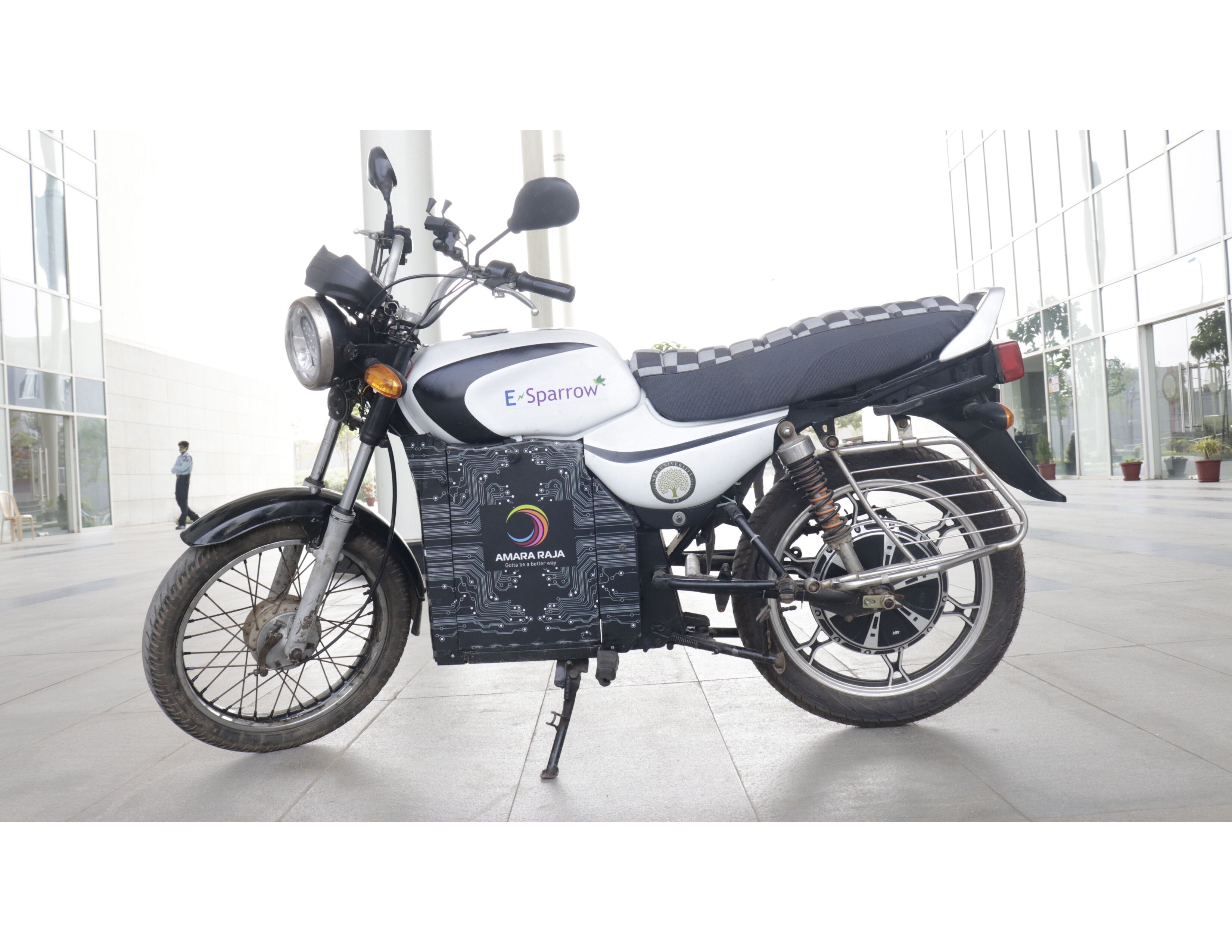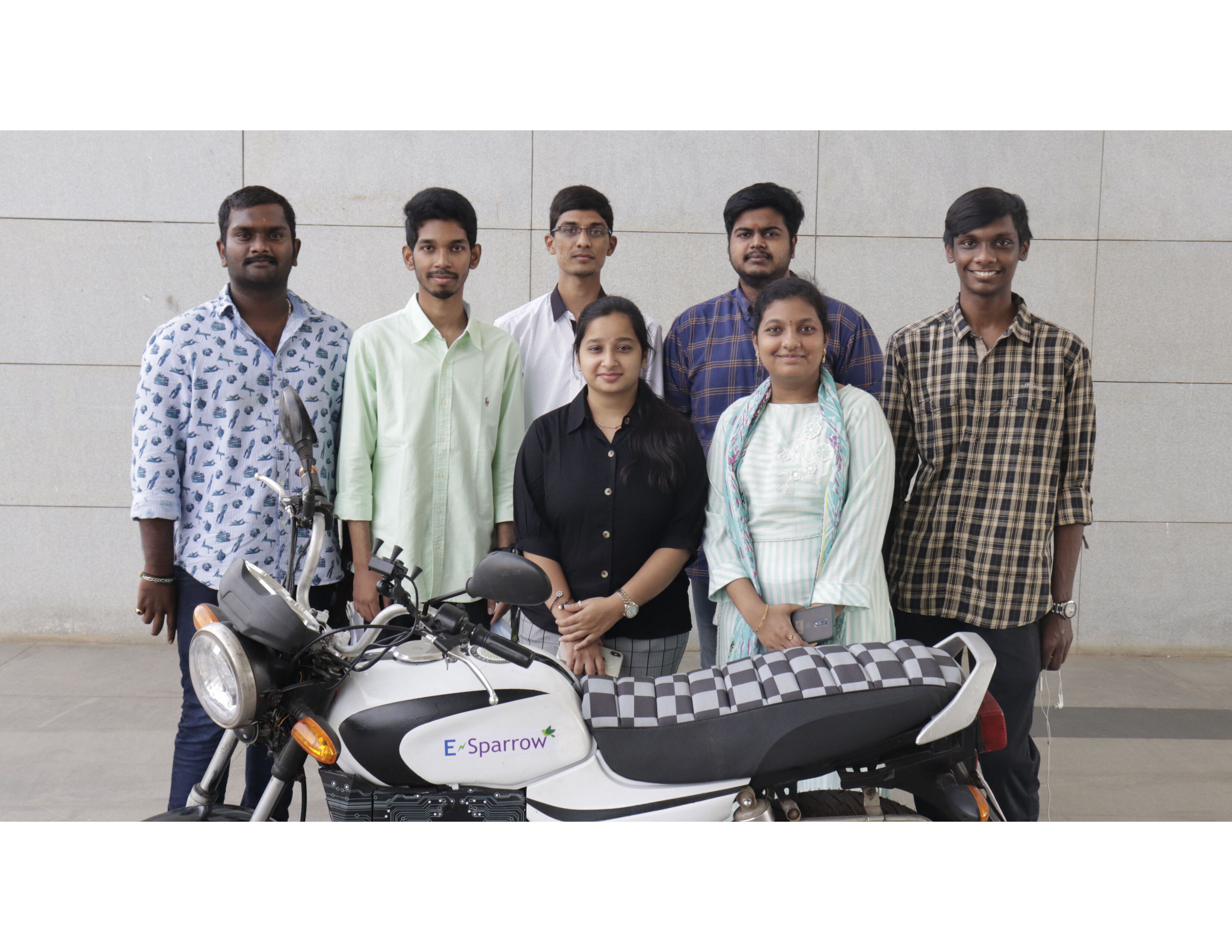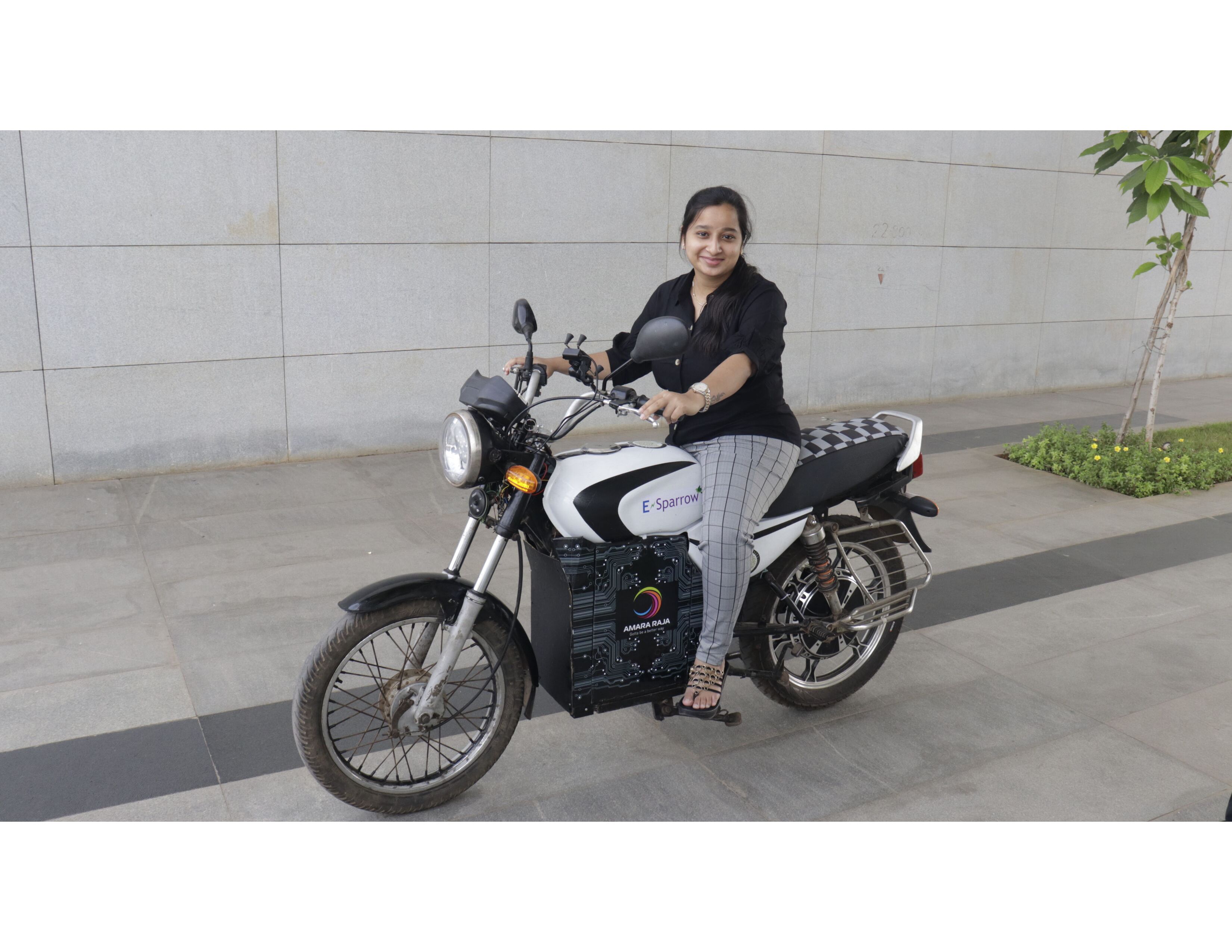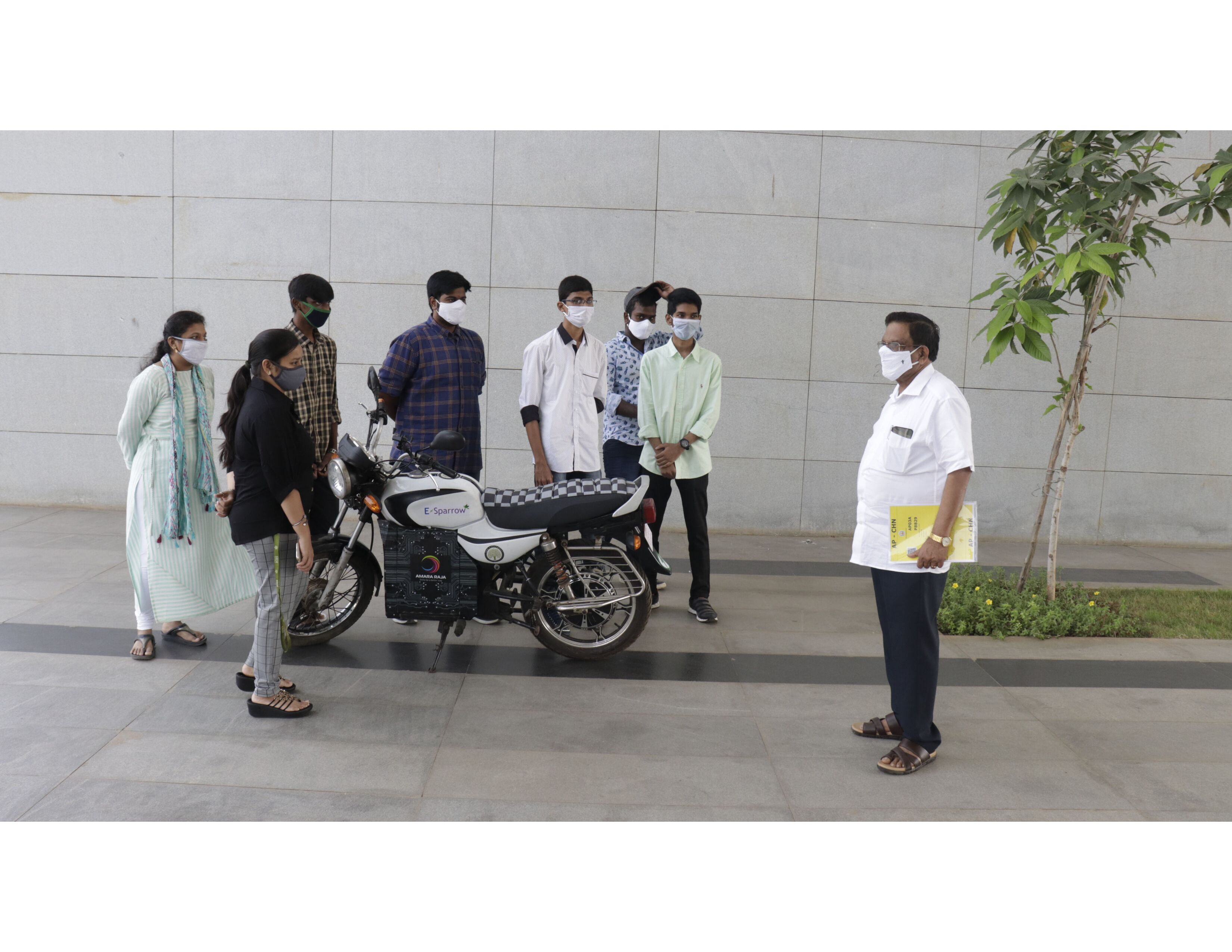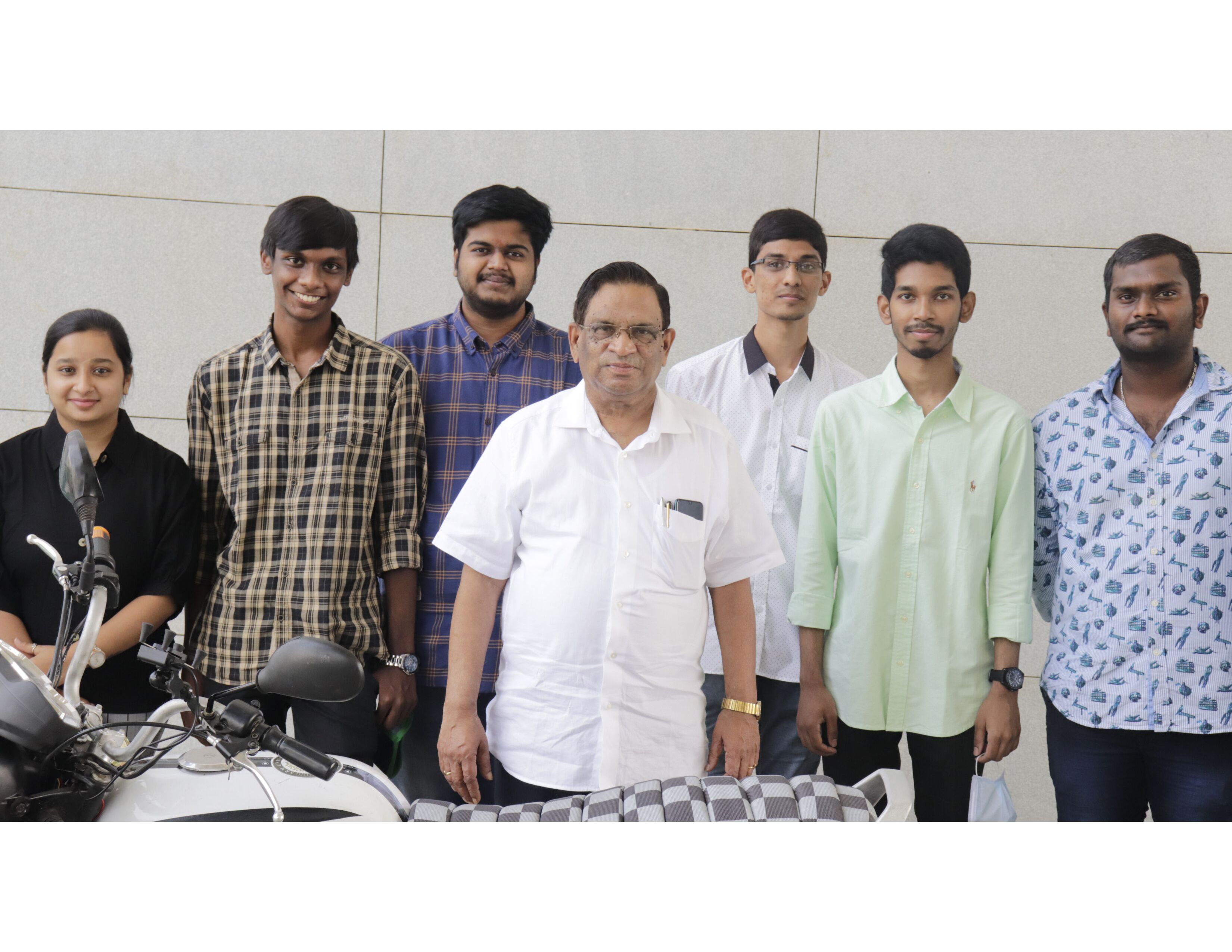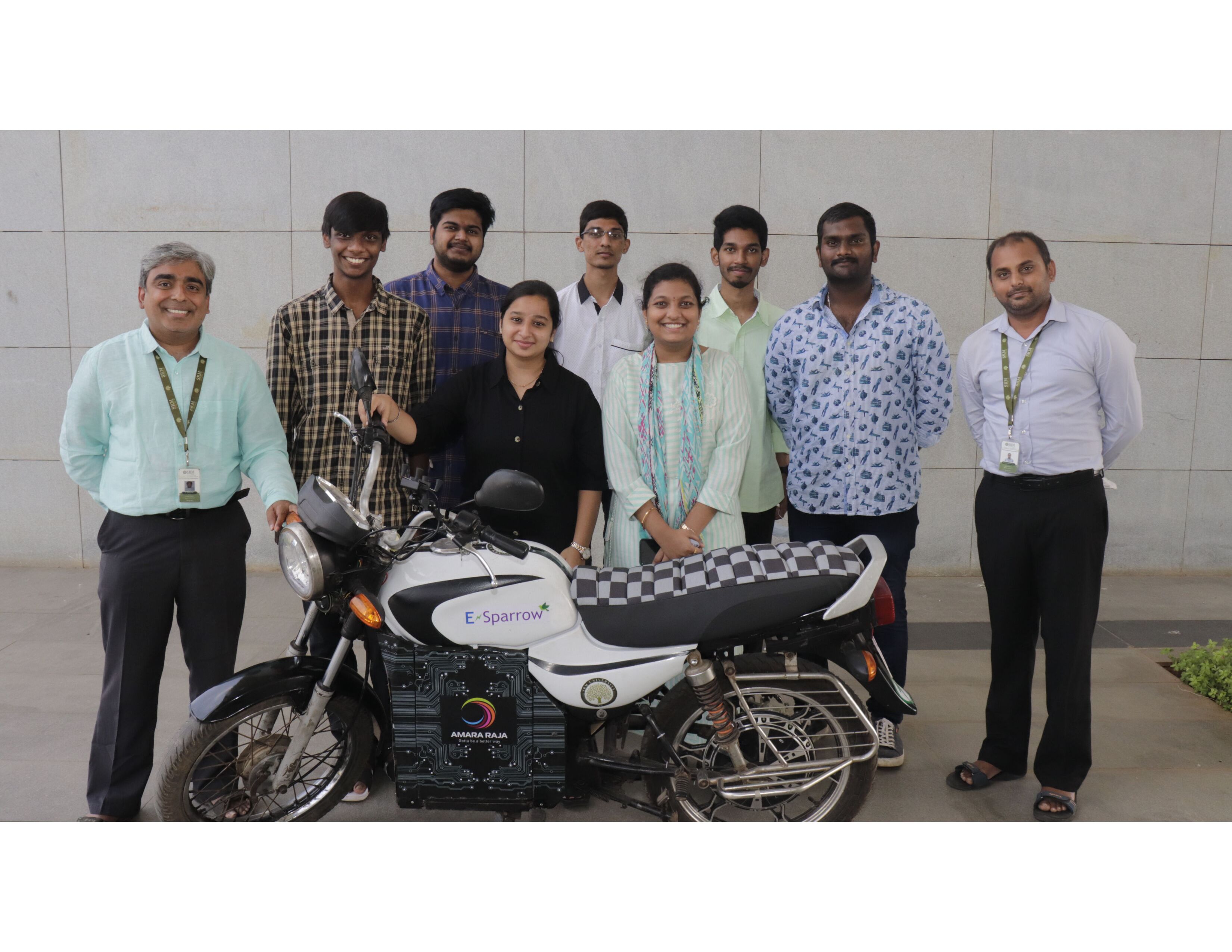Energy-Aware Task Allocation for Multi-Cloud Networks
Smart algorithm to optimize performance of the heterogeneous multi-cloud network
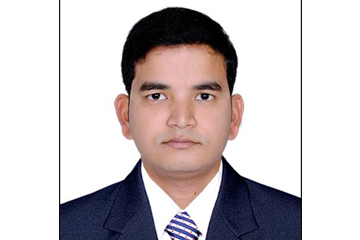 Dr Sambit Kumar Mishra
Dr Sambit Kumar Mishra
As the world goes more digital in the future, the dependability on cloud computing is going to be more. The availability of high-capacity networks, low-cost computers and storage devices as well as the widespread adoption of hardware virtualization, service-oriented architecture and autonomic and utility computing has led to growth in cloud computing. But is it enough? How to improve its performance? How to make it more reliable with high-end technology and impeccable performance quality? Dr Sambit Kumar Mishra’s research has an answer to that.
 System Model for Multi-cloud Networks Dr Sambit Kumar Mishra, Assistant Professor, Computer Science and Engineering has published a paper “Energy-Aware Task Allocation for Multi-Cloud Networks” in renowned journal IEEE ACCESS with an Impact Factor: 3.745. The research was done in collaboration with Dr Sonali Mishra, SOA (Deemed to be) University Bhubaneswar, India; Dr Ahmed Alsayat, College of Computer and Information Sciences Jouf University, Al-Jouf, Saudi Arabia; Dr N Z Jhanjhi and Dr Mamoona Humayun, School of Computer Science and Engineering (SCE), Taylor’s University, Malaysia; Dr Ashish Kr. Luhach, The PNG University of Technology, Papua New Guinea Lae, Morobe; Dr Kshira Sagar Sahoo, VNRVJIET, Hyderabad, India.
System Model for Multi-cloud Networks Dr Sambit Kumar Mishra, Assistant Professor, Computer Science and Engineering has published a paper “Energy-Aware Task Allocation for Multi-Cloud Networks” in renowned journal IEEE ACCESS with an Impact Factor: 3.745. The research was done in collaboration with Dr Sonali Mishra, SOA (Deemed to be) University Bhubaneswar, India; Dr Ahmed Alsayat, College of Computer and Information Sciences Jouf University, Al-Jouf, Saudi Arabia; Dr N Z Jhanjhi and Dr Mamoona Humayun, School of Computer Science and Engineering (SCE), Taylor’s University, Malaysia; Dr Ashish Kr. Luhach, The PNG University of Technology, Papua New Guinea Lae, Morobe; Dr Kshira Sagar Sahoo, VNRVJIET, Hyderabad, India.
 Example of Direct Acyclic Graph (DAG)with four TasksIn recent years, the growth rate of Cloud computing technology is exponentially, mainly for its extraordinary services with expanding computation power, the possibility of massive storage and all other services with the maintained quality of services (QoS). The task allocation is one of the best solutions to improve different performance parameters in the cloud, but when multiple heterogeneous clouds come into the picture, the allocation problem becomes more challenging. This research work proposed a resource-based task allocation algorithm. The same is implemented and analysed to understand the improved performance of the heterogeneous multi-cloud network. The proposed task allocation algorithm (Energy-aware Task Allocation in Multi-Cloud Networks (ETAMCN)) minimizes the overall energy consumption and also reduces the makespan. The results show that the makespan is approximately overlapped for different tasks and does not show a significant difference. However, the average energy consumption improved through ETAMCN is approximately 14%, 6.3%, and 2.8% in opposed to the random allocation algorithm, Cloud Z-Score Normalization (CZSN) algorithm, and multi-objective scheduling algorithm with Fuzzy resource utilization (FR-MOS), respectively. An observation of the average SLA-violation of ETAMCN for different scenarios is performed.
Example of Direct Acyclic Graph (DAG)with four TasksIn recent years, the growth rate of Cloud computing technology is exponentially, mainly for its extraordinary services with expanding computation power, the possibility of massive storage and all other services with the maintained quality of services (QoS). The task allocation is one of the best solutions to improve different performance parameters in the cloud, but when multiple heterogeneous clouds come into the picture, the allocation problem becomes more challenging. This research work proposed a resource-based task allocation algorithm. The same is implemented and analysed to understand the improved performance of the heterogeneous multi-cloud network. The proposed task allocation algorithm (Energy-aware Task Allocation in Multi-Cloud Networks (ETAMCN)) minimizes the overall energy consumption and also reduces the makespan. The results show that the makespan is approximately overlapped for different tasks and does not show a significant difference. However, the average energy consumption improved through ETAMCN is approximately 14%, 6.3%, and 2.8% in opposed to the random allocation algorithm, Cloud Z-Score Normalization (CZSN) algorithm, and multi-objective scheduling algorithm with Fuzzy resource utilization (FR-MOS), respectively. An observation of the average SLA-violation of ETAMCN for different scenarios is performed.
 Energy Consumption Vs SLA Violation when
Energy Consumption Vs SLA Violation when
the number of VMs varies and the number of Task is 100.The multi-cloud strategy offers flexibility to service providers. It allows businesses to be productive while using the proper set of services to optimize their opportunities. Adopting a multi-cloud network enables an enterprise to implement a “best of breed” model for the services. Organizations’ ability to choose the vendor that offers the best price for their workload is added significant advantage of multi-cloud. Thus, the optimization of energy consumption in a multi-cloud environment is necessary for the current generation.
However, this proposed work has not considered any priority-oriented users, such as task execution through reserve resource in the network, which will be considered as his future work. The future work also aims to propose a task cum resource-aware scheduling approach that will exploit the nature of the presented workload and efficiently map on the available Cloud resources so that energy consumption will optimize.
Link to the research paper: Please Click Here
- Published in CSE NEWS, Departmental News, News, Research News
DST, Government of India sanctions an outlay of Rs.14.63 lakhs to Dr Tapan Kumar Hota
Connecting the dots between Mathematics and Physics of the hydrodynamic instability known as Viscous Fingering (VF)
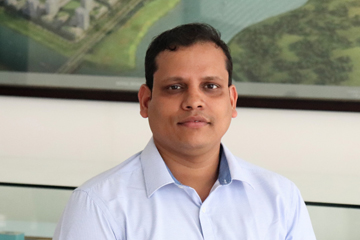
DST, Government of India, sanctioned a total outlay of Rs.14.63 lakhs to Dr Tapan Kumar Hota, Assistant Professor, Department of Mathematics, SRM University-AP, Andhra Pradesh, for pursuing research on “Mathematical analysis and Adjoint Based Stability for a Coupled Convection-Diffusion equation in Miscible Displacement”. Hydrodynamic Stability (Instability) is a study of an equilibrium point subject to small and/or medium disturbances. This assists in understanding several complicated natural phenomena such as fluid transition from laminar to turbulent, chemical mixing, formation of cloud, and others. The available stability analysis is unable to address the early-time evolution of the VF process. The early-time behaviour of the system helps us to choose the parameters that are responsible for the long-time behaviour of the coupled PDEs. To achieve the target, we need to address the linear stability of the system from the study of the singular-value-decomposition instead of traditional eigenvalue analysis. As the system is non-autonomous, the eigenvectors/eigenvalues may not be physically relevant. Further, it is required to confirm our linear stability analysis by mathematical analysis of the coupled non-linear PDEs.
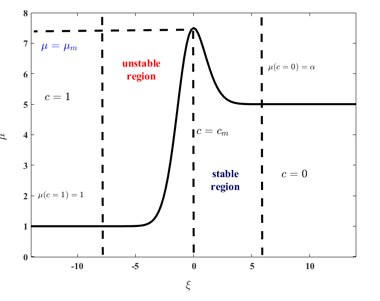
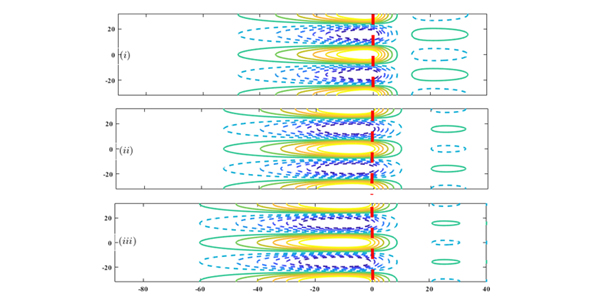
‘The nonmonotonic viscosity profile when a high mobile fluid is displacing a less mobile fluid. There is a potentially unstable region, where the viscosity increases in the flow direction, followed in the downstream direction by a potentially stable region, where the viscosity decreases in the flow direction. The disturbance structure is computed using the singular-value decomposition of the propagator matrix. Reference: Hota & Mishra, Journal of Fluid Mech, Vol. 856, pp:552-579, 2018.’
Dr Tapan is keen on studying other branches of science to provide the correct mathematical approach to address the issues. His project will address one of the hydrodynamic instabilities known as viscous fingering (VF). It forms when a high mobile fluid displaces a low mobile fluid. It has enormous implications in the field of Chemical Engineering Science, Petroleum Engineering, Chromatography, and Oil Extraction process. He explains, “I will study this instability from a mathematician’s point of view, more precisely, to address the mathematical analysis of coupled partial differential equations (PDEs). The system that governs the VF is non-autonomous and there is no readily available stability analysis that can represent Physics, based on robust mathematical analysis. My aim is to connect the dots between mathematics and physics of the VF.”
Infrastructure and laboratory facilities are crucial to conduct research. Upon receiving approval from a prestigious organization like SERB (Science and Engineering Research Board), Govt. of India, Dr. Tapan is entitled to this unique opportunity to serve the scientific community. He divulges, “The award is not only a recognition to me but also to the SRM University, AP. The University will be more visible in the world of research and can attract more eminent scientists and researchers to make the University their second home.” Quoting Master Oogway, ‘Yesterday is history, Tomorrow is a mystery… Today is a gift, that’s why it is called present.’, Dr Tapan is eager to commence working on his project at the earliest, and looks forward to enjoying the process of accomplishing the task.
- Published in Math News, News, Research News
Dr Tousif Khan N elected as a Joint Secretary of ACDOS
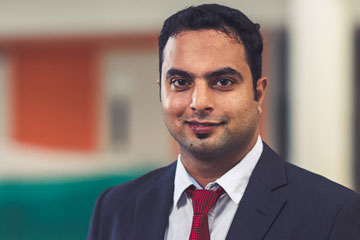 Dr Tousif Khan N, Head of the Department, Electrical and Electronics Engineering at SRM University-AP, Andhra Pradesh has been elected as a Joint Secretary (2020-2023) of the prestigious Automatic Control and Dynamic Optimization Society (ACDOS), Indian national member organization of International Federation of Automatic Control (IFAC). The objective of ACDOS is to promote automatic control and dynamic optimization fields in academia and industry across India. The society aims to host international conferences and technical workshops regularly in order to promote close interaction between industry professionals and academia. The society also participates in curriculum development for graduate and under-graduate studies in addition to facilitating productive research in this area. The society volunteers to honour eminent persons who excelled in this field in industry and academic circles.
Dr Tousif Khan N, Head of the Department, Electrical and Electronics Engineering at SRM University-AP, Andhra Pradesh has been elected as a Joint Secretary (2020-2023) of the prestigious Automatic Control and Dynamic Optimization Society (ACDOS), Indian national member organization of International Federation of Automatic Control (IFAC). The objective of ACDOS is to promote automatic control and dynamic optimization fields in academia and industry across India. The society aims to host international conferences and technical workshops regularly in order to promote close interaction between industry professionals and academia. The society also participates in curriculum development for graduate and under-graduate studies in addition to facilitating productive research in this area. The society volunteers to honour eminent persons who excelled in this field in industry and academic circles.
Dr Tousif Khan N is an Assistant Professor in the Department of Electronics and Electrical Engineering at SRM University-AP, Andhra Pradesh. He has obtained his PhD from Indian Institute of Technology, Guwahati. Apart from performing his duties as a teacher, he is pursuing his research career in Control systems, Power Electronics and Optimization Techniques. The very young and talented professor has been honoured with several awards and recognitions for his pursuits in the domains of Teaching and Research. As a Joint Secretary of ACDOS, Dr Khan wishes to contribute further to the versatile worlds of Research and Academia.
The other members of ACDOS are eminent researchers and scientists such as Prof. Sukumar Mishra (IIT Delhi) as President, Dr Jayesh Barve (GE, Bangalore) as Vice-President and President-Elect, Dr Shaik Faruque Ali (IIT Madras) Vice-President, Prof Bidyadhar Subudhi (IIT Goa) as Vice-President, Dr Arnab Maity (IIT Bombay) as General Secretary, Dr S. N Omkar (IISc-Bangalore) as Treasurer and Prof Radhakant Padhi (IISc Bangalore) as Director of Operations.
To know more about ACDOS, please click the link: https://www.acdos.org/
SRMAP faculty recognised by Stanford University among the top Biotechnologists
Dr Imran Pancha from the Department of Biological Sciences, SRM university – AP is recognised in Biotechnology among the top 2% scientists/researchers across the world By Stanford University Researchers. Recently an article has been published in PLOS Biology by Stanford University Researchers on the highly cited researchers in 22 different fields and their subfields. In the Biotechnology field, 1,074 scientists/faculty members were identified, and Dr Imran Pancha is one amongst them. From India, only 77 scientists/faculty members could achieve this honour, and Dr Imran Pancha is one among them. This is an admirable achievement for a young faculty from a nascent University to be in the top 2% scientists of the world. Dr P Sathyanarayanan, the President of SRM University-AP honoured Dr Pancha for bringing this scientific laurel to the university.
Overall, of the top 160,000 scientists from different fields of Science & Technology, India hosts 2,313 scientists/faculty members. This list comprises of the prominent and illustrious scientists from India.
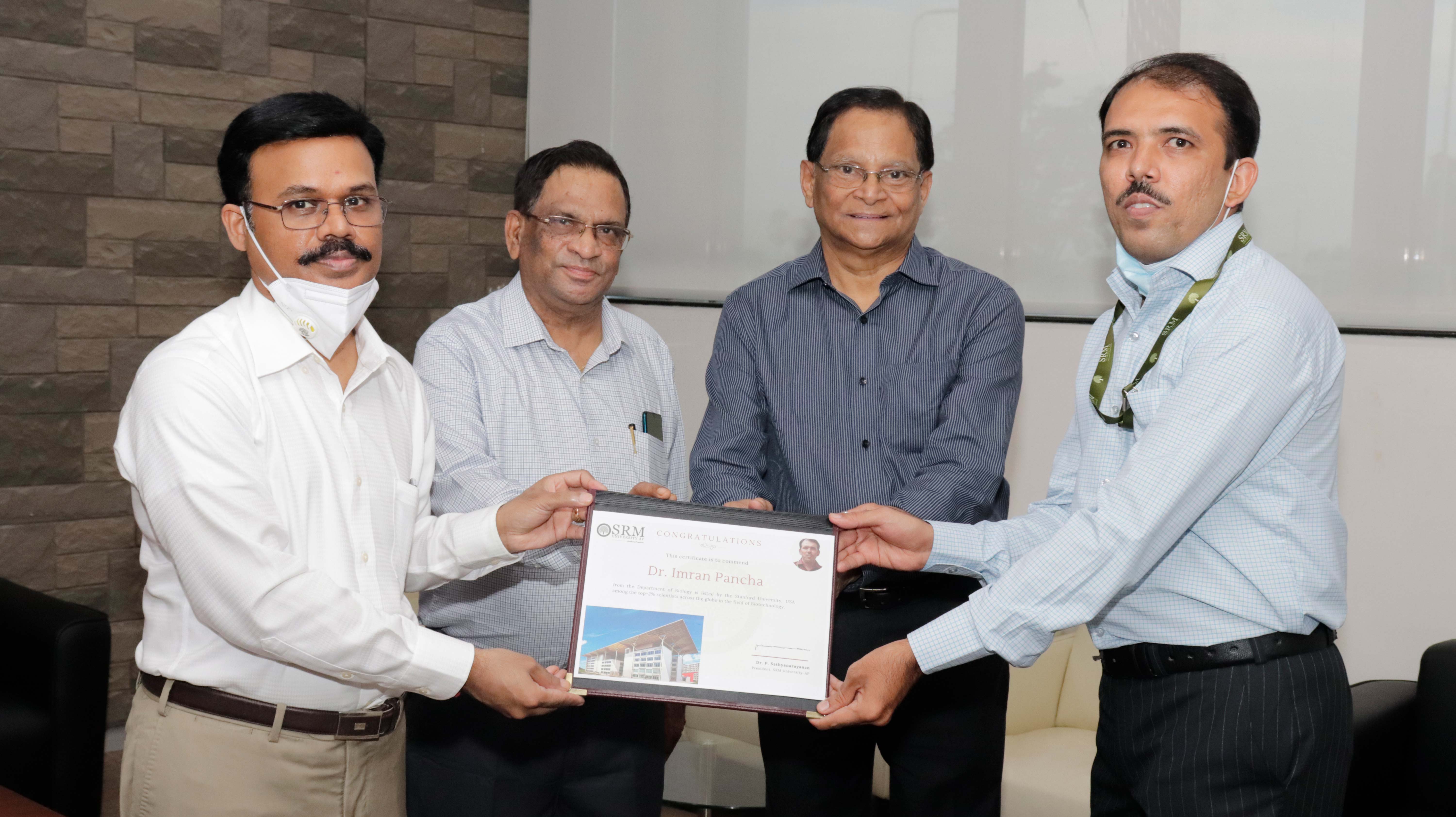
Dr Imran Pancha is a young researcher working as an Assistant Professor in the Department of Biological Sciences in SRM University-AP, Andhra Pradesh. He has obtained his doctoral degree from CSIR-Central Salt and Marine Chemicals Research Institute-Bhavnagar after graduating from Bhavnagar University. He has also worked as a post-doctoral fellow at Japanese Society for Promotion of Science, Japan before joining SRM University-AP.
Dr Pancha’s primary research focus is to produce renewable energy from microalgae. His team is trying to develop integrated microalgal bio-refinery to produce high-value compounds like phycobiliproteins, carotenoids along with biofuel and bio-fertilisers from microalgae. Apart from this, he is also interested to understand algal-bacterial interaction, particularly isolate and characterise the microalgae associated bacteria and finding their role in growth enhancement and inhibition in microalgae.
- Published in Biology News, News, Research News
ECE Student sets sail to King’s College, London for Masters studies
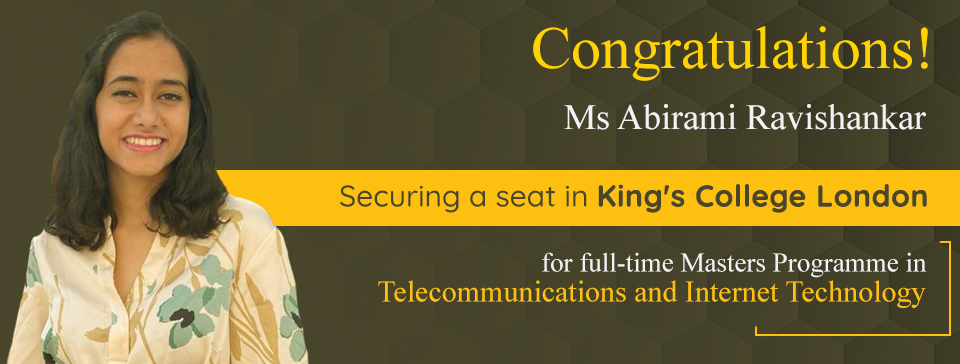 Nothing brings more pleasure than seeing our students being recognised in the best educational institutions abroad. Ms Abirami Ravishankar has secured a seat in King’s College London for their full-time Master’s Programme in Telecommunications and Internet Technology. She is in the final year of B. Tech in the Department of Electronics and Communication Engineering. The duration of the Master’s programme is one year, and she will be joining her programme in September 2021.
Nothing brings more pleasure than seeing our students being recognised in the best educational institutions abroad. Ms Abirami Ravishankar has secured a seat in King’s College London for their full-time Master’s Programme in Telecommunications and Internet Technology. She is in the final year of B. Tech in the Department of Electronics and Communication Engineering. The duration of the Master’s programme is one year, and she will be joining her programme in September 2021.
King’s College, London is well known throughout the world for its eminence. It is one of the top institutes with high QS ranking. Abirami informed that the admission process in such a reputed institute is very rigorous and challenging. King’s College, London accepts only 10% of all the applications each year. “The sheer credit goes to my professors who briefed me on the admission process and guided to crack it. Thanks to the incredible learning experience at SRMAP, I was able to achieve a thorough understanding in my subjects, which helped me immensely during my application days. King’s College, London minutely judges the applicant’s overall knowledge and depth before offering them admission. However, for me, it was no tough job because of my excellent grooming here at SRMAP. I sincerely thank all my professors for all their efforts in making me a good engineer, and now I wish to avail this opportunity to prosper and make a difference to the world in the coming days,” says Abirami, deeply overwhelmed.
“We are very happy for Abirami for her enrolment in the Master’s programme at King’s College, London. We, the faculty of SRMAP, always strive to provide best guidance and support to our students. Abirami is a meritorious student who aspires to do something for herself as well as for the community. We wish her all the best for her future. She can always count on our support whenever she needs it,” said Prof Siva Sankar Yellampalli, who has closely witnessed Abirami throughout the years of her undergraduate studies. Prof Yellampalli is also the Professor and Head in the Department of Electronics and Communication Engineering.
- Published in Departmental News, ECE NEWS, News, Students Achievements
Undergraduate students design e-bike for sustainable environment
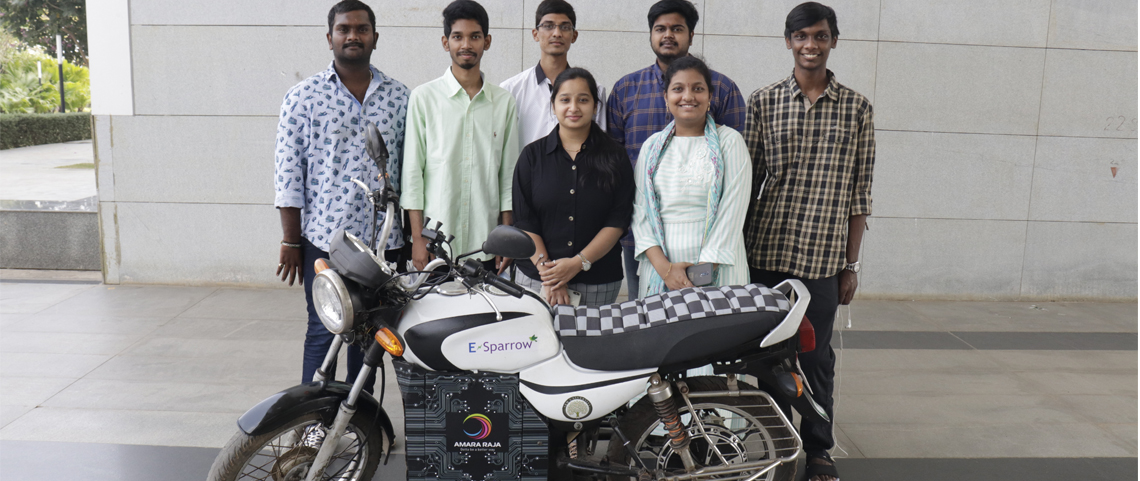
Advancing the celebration, Prof D Narayana Rao, Pro Vice-Chancellor, SRM AP took the virtual podium to comment “Science and Technology is the driving force for the economic development of India. We need to encourage young scholars by providing a vibrant and conducive research environment. Expanding the frontiers of knowledge by triggering interest among students must be the priority of the institutions. Also, focus should be on translational research with societal applications through collaborative research to make our nation a global leader.”
The team comprises of undergraduate students – Mr Raviteja Reddy, Mr A Chaitanya, Mr P M Aditya, Mr K Praveen, K Yeshashwini, A Sravya, K Vasu, and G Priyanka along with faculty members – Dr Venkata N Nori, Associate Professor, and Dr Panchagnula Jayaprakash Sharma, Assistant Professor, Department of Mechanical Engineering. Aditya reveals, “We endured several challenges in various aspects of retrofitting the conventional petrol motorcycle. Also, designing a portable battery system, enhancing the performance of the Hub motor, Chassis improvements, etc. enriched our understanding of electric vehicles and manufacturing techniques.”
Conversion of IC engine bike to an e-bike is considered to be a potential business venture by the team. Sharing their forthcoming plans, Aditya informs, “We are working on additional designs and ideas to incorporate the best possible features to make the e-bike more reliable. We heartily thank Prof D Narayana Rao, Pro Vice-Chancellor, for his continuous support. Also, Dr Venkata Nori and Dr Jayaprakash propelled us to create a steadfast model by relentlessly helping us in improving our design to make our model more cost-effective.”
- Published in Mechanical Engineering NEWS, News, Research News
Undergrad student receives envious internship offer from Adobe India with 1 LPM
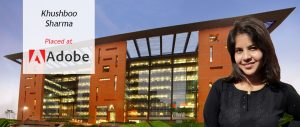 Khushboo Sharma is one of the brightest gems in the Department of Computer Science and Engineering. She is currently pursuing her third year in undergraduate studies. She has recently bagged an envious summer internship offer at one of the most reputed companies- Adobe India, a multinational software company. Through their women-only hiring challenge “SheCodes”, Khushboo not only bagged an internship offer but she may also have an opportunity of a Pre Placement Offer, upon successful review after this internship with attractive pay package. She will be joining Adobe India in May 2021 for the internship of 10-12 weeks with a stipend of 1 lakh rupees per month.
Khushboo Sharma is one of the brightest gems in the Department of Computer Science and Engineering. She is currently pursuing her third year in undergraduate studies. She has recently bagged an envious summer internship offer at one of the most reputed companies- Adobe India, a multinational software company. Through their women-only hiring challenge “SheCodes”, Khushboo not only bagged an internship offer but she may also have an opportunity of a Pre Placement Offer, upon successful review after this internship with attractive pay package. She will be joining Adobe India in May 2021 for the internship of 10-12 weeks with a stipend of 1 lakh rupees per month.
Mr Vivekanandan, Assistant General Manager, Department of Corporate Relations and Career Services (CR&CS), says “It is a proud moment for the university. SRM University-AP is full of bright students with huge potential. It is our sincere responsibility to bring out the best in them and help them find the right place in the industry.” Khusboo asserted that the training process in the Department of CR&CS was rigorous. Be it attitude development or interview preparations, the CR&CS department has extended continuous guidance and support along with mock sessions. Mr Vivekanandan further informed that the training programmes of SRM University-AP are designed by the experts to make students prepare for every challenge that they might face in a competitive world. They even organise some training sessions that are company-specific. Needless to say, that the placement department is not ready to leave any stone unturned when it comes to the future of its students. The placement team thoroughly guided Khushboo in the four-month-long hiring process in Adobe.
Khushboo expressed her gratitude, saying that it would not have been possible for her to crack this challenge without the continuous guidance and support provided by her teachers and the placement team. The modernised industry-oriented curriculum helped her gain the necessary in-depth knowledge to excel in her studies. Khushboo is also a part of tech-based clubs of SRM university-AP and always strives to think something out of the box. Her zeal towards scaling new heights and perseverance her made her achieve this offer.
- Published in CR&CS, CR&CS NEWS, CSE NEWS, Departmental News, News, Students Achievements
Young researcher presents research paper amidst scholars at global conference – ICCCS 2020
Nikhila Korivi offers revolutionary approach to ensure Data Security
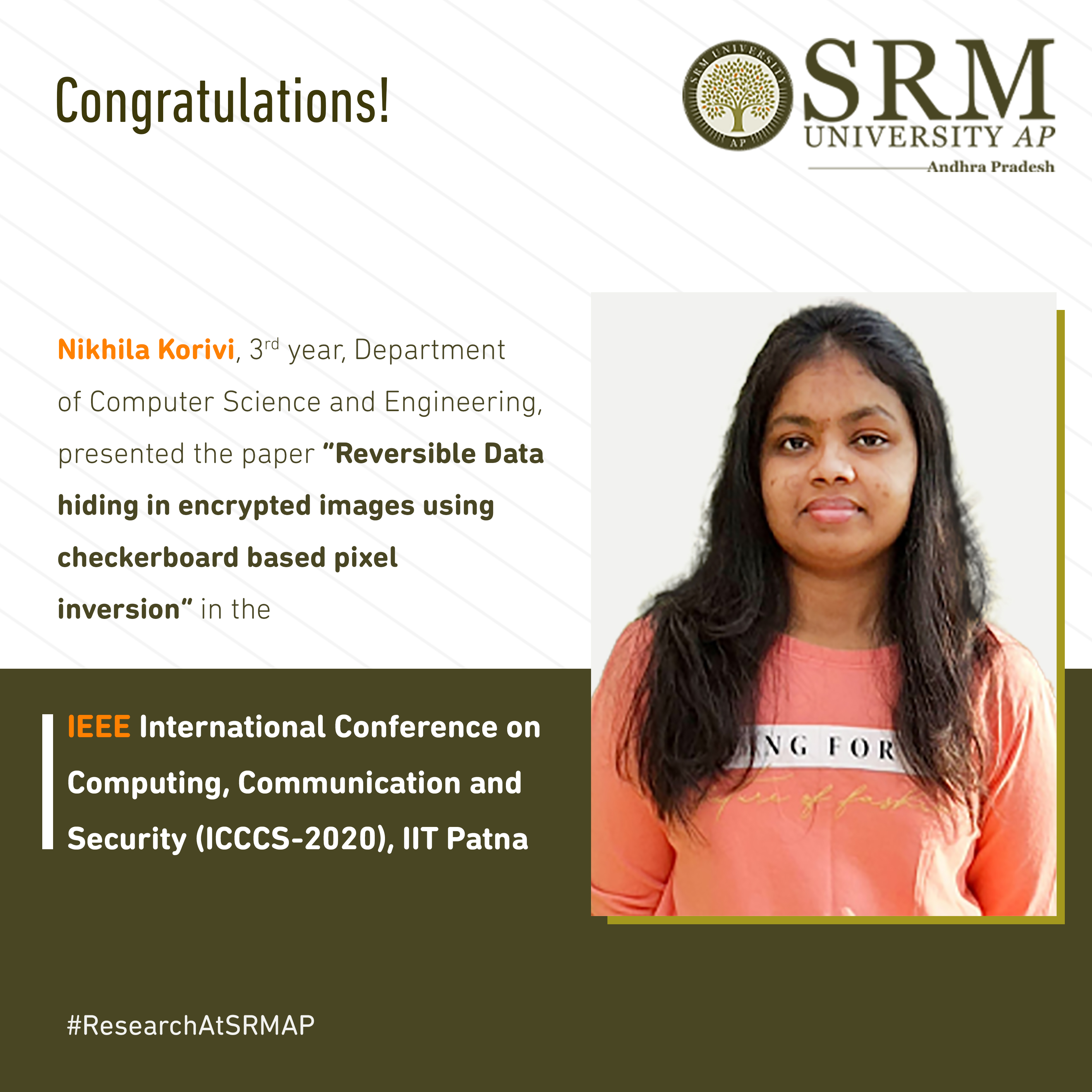 Nikhila Korivi, third year, Department of Computer Science and Engineering, SRM University- AP, Andhra Pradesh was steered by Dr Manikandan V M, Assistant Professor, Department of CSE, to present the pioneering research paper “Reversible Data hiding in encrypted images using checkerboard based pixel inversion” in the IEEE International Conference on Computing, Communication and Security (ICCCS-2020), IIT Patna, held on October 14-16, 2020.
Nikhila Korivi, third year, Department of Computer Science and Engineering, SRM University- AP, Andhra Pradesh was steered by Dr Manikandan V M, Assistant Professor, Department of CSE, to present the pioneering research paper “Reversible Data hiding in encrypted images using checkerboard based pixel inversion” in the IEEE International Conference on Computing, Communication and Security (ICCCS-2020), IIT Patna, held on October 14-16, 2020.
Nikhila and her mentor, Dr Manikandan V M, worked on the paper conjointly for which, she is profoundly grateful to the professor. She says, “I thank Dr Manikandan and my other professors at SRM University-AP for their continuedguidance that inspired me to do research. Their encouragement propelled me to successfully present the research paper at ICCCS-2020, a conference revered by the entire scientific community.”
Nikhila has been keen on exploring and broadening her horizon of knowledge. Right from her early undergraduate days, Nikhila was intrigued by Information Security, an emerging discipline in the modern era. Soon she recognized that Reversible Data Hiding is an active research area in the realm of Information Security, which has extensive application in Medical Image Transmission, and Cloud Computing.
On approaching her professor, Dr Manikandan enthused Nikhila to embark on the research work and propose a new Reversible Data Hiding scheme in encrypted images by using a checkerboard pattern-based pixel inversion technique. Nikhila informs, “The proposed scheme ensures a better bit error rate without compromising on the embedding rate. The algorithms were implemented using Matlab-2019 and the experimental studies of the proposed scheme have been carried out using a standard image dataset (USC-SIPI) managed by the University of Southern California.”
This revolutionary approach is immensely beneficial when it comes to Data Security, and it is widely implemented in medical image transmission along with many other sectors. Fostering her interest in pursuing research and advanced studies, Nikhila plans to enhance her research work by focusing on designing and developing new Reversible Data Hiding schemes with better embedding rates without compromising other efficiency parameters such as computational complexity, robustness, and bit error rate.
- Published in CSE NEWS, News, Research News
ECE Undergrads developed AI-based communication app for deaf and blind
Won prestigious i-Hack Alpha with a cash prize of $2300
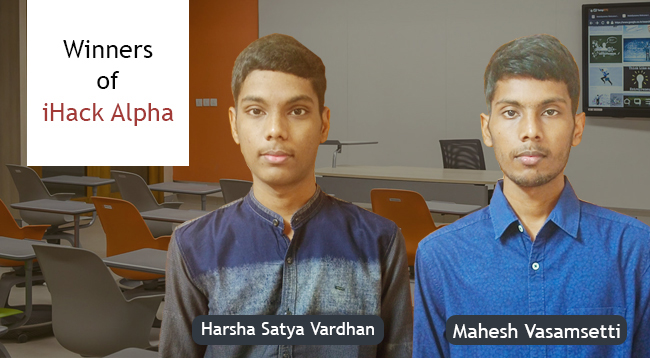 Department of Electronics and Communication Engineering rejoices in the exhilarating success of Harsha and Mahesh, the winners at iHack Alpha Hackathon. iHack Alpha was an AI-Hackathon, where developers from all backgrounds were invited to solve real-world problems with innovative AI solutions powered by sentient.io AI and Data platform. Unlike the usual hackathons, it was conducted over three weeks, starting from December 2, 2020, and finished on December 27, 2020, and participants were supposed to present a full-fledged application. Four themes were given to participants to work on in the hackathon- 1) Use of AI in retail 2) Use of AI in Customer service 3) Use of AI in media 4) Use of AI in Accessibility.
Department of Electronics and Communication Engineering rejoices in the exhilarating success of Harsha and Mahesh, the winners at iHack Alpha Hackathon. iHack Alpha was an AI-Hackathon, where developers from all backgrounds were invited to solve real-world problems with innovative AI solutions powered by sentient.io AI and Data platform. Unlike the usual hackathons, it was conducted over three weeks, starting from December 2, 2020, and finished on December 27, 2020, and participants were supposed to present a full-fledged application. Four themes were given to participants to work on in the hackathon- 1) Use of AI in retail 2) Use of AI in Customer service 3) Use of AI in media 4) Use of AI in Accessibility.
Harsha and Mahesh chose to work on the use of AI in the Accessibility theme, where they were asked to build an AI – solution using the sentient.io services. The whole hackathon was divided into three phases 1.) Ideation Phase 2) Build Phase 3) Finals.
Around 1083 teams participated across countries such as India, Malaysia, the Philippines, Indonesia, and Singapore.
Harsha and Mahesh found their inspiration in the story of Helen Keller and decided to build an app with ease of accessibility for the blind and deaf persons. As Annie Sullivan used to help Helen in her communication, Harsha and Mahesh thought, why can’t they create an app which can be installed on the mobile phone and will do the same! The duo turned this crazy idea into reality by developing Artificial Voice- a communication app for the blind and deaf. Artificial Voice is a bidirectional communication app for the deaf and blind to send and receive messages with the help of AI-based technology such as Automatic Speech recognition, Text to speech converter, Audio format converter.
The whole Hackathon was broadcasted online. Harsha and Mahesh’s presentation on Artificial Voice received high praise and acclaims from the judges, and the Team SRMAP(aka Team Square) secured first place in the prestigious i-Hack Alpha hackathon with a grand cash prize of $2300. Harsha is currently pursuing his 3rd year B. Tech Studies whereas Mahesh is in the 2nd year of his undergraduate studies at the Department of Electronics and Communications Engineering. “This success at i-Hack Alpha hackathon has boosted our confidence. We are working on better versions of the app and some other projects that can contribute to society,” said Harsha.
- Published in Departmental News, ECE NEWS, News, Students Achievements
Undergrad CSE student bags envious placement offer with a CTC of 20 Lakh LPA
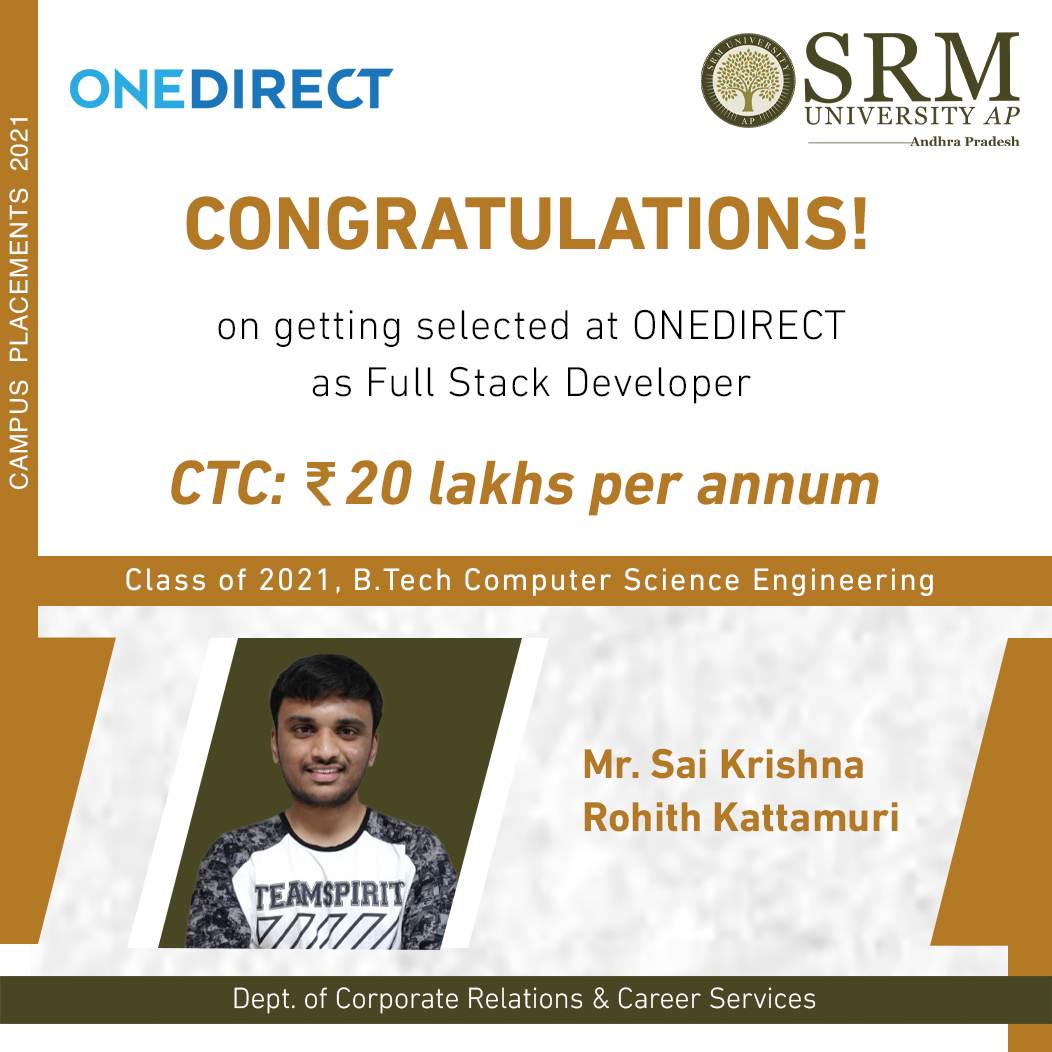 Another proud moment for SRM University-AP when Kattamuri Sai Krishna Rohith bagged an envious job offer from ODCEM Technologies Pvt. Ltd. (OneDirect) with a CTC of 20 Lakhs per annum. He is pursuing his B. Tech final year in the Department of Computer Science and Engineering.
Another proud moment for SRM University-AP when Kattamuri Sai Krishna Rohith bagged an envious job offer from ODCEM Technologies Pvt. Ltd. (OneDirect) with a CTC of 20 Lakhs per annum. He is pursuing his B. Tech final year in the Department of Computer Science and Engineering.
Mr Rohith will be joining the company as an intern for six months with monthly compensation of Rs. 20,000. After six months of internship, he will be offered the permanent employee as a Full Stack Developer with a CTC of Rs. 20,00,000 per annum.
Mr Rohith went through rigorous placement training programmes conducted by the Department of Corporate Relations and Career Services to secure the job offer. The job hiring process for this role was conducted in four stages. After preliminary selection, Mr Rohith had to prove his ability in coding, aptitude and other technical domains. The Director of Engineering himself took the final call before offering him a position in the company to see if Rohith is a proper fit for their company.
Rohith expressed his gratitude towards the CR & CS department of SRM University-AP, saying that the training sessions strengthened his core skills and abilities. He was also taught to face interviews and critical questions. Mr Rohith said, “Placement is an arduous process. I was offered another position in other company before, but I was not happy with that offer. I had faith in my abilities, so I continued searching for better opportunities and improve my skill set to secure the Super Dream offer. Keeping nerves in control, not panicking during interviews, excellent communication skills are some essential qualities that everyone should master to get good jobs. I am thankful to the CR & CS department for all their support and customised, personal, need-based assistance, which helped me a lot to prepare for the interviews,” said Mr Rohith.
After five months of determination, Mr Rohith finally secured the job that he was looking for. “The University has provided us with numerous opportunities with a flexible curriculum and Global standards. In addition to all the training, my mentors encouraged me to participate in Hackathons, apply for research internships, and attend conferences. Thanks to the extraordinary faculty that we have, the regular classes were of great help in enhancing my technical knowledge,” asserted Mr Rohith. Mr Rohith was a proud track-winner of Microsoft and EthDenver hackathons and a research Intern at Nanyang Technological University (NTU) Singapore.
He has shared his mantra to success with his fellows. Mr Rohith believes that instead of panicking or comparing with others, one should focus on becoming a better version of oneself, and the success will find him.
- Published in CR&CS, CR&CS NEWS, CSE NEWS, News


